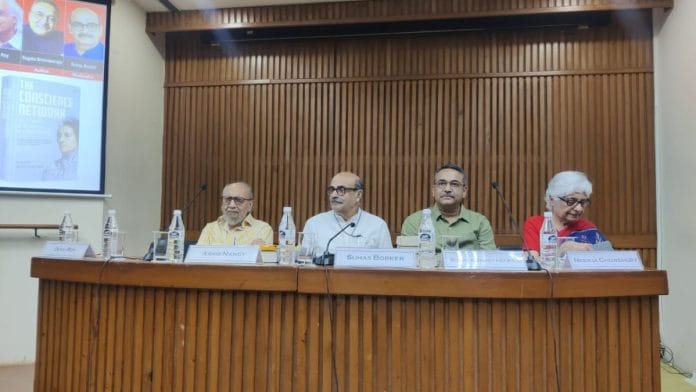New Delhi: Fifty years after the Emergency shook India’s democracy, memories of that turbulent time are being revisited with renewed clarity and emotion. The launch of The Conscience Network: A Chronicle of Resistance to a Dictatorship by journalist Sugata Srinivasaraju at the India International Centre in New Delhi marked the solemn “Black Day” anniversary.
The event brought together prominent voices like political psychologist Ashis Nandy, journalist Neerja Chowdhury, and social scientist Dunu Roy, with activist Suhas Borker moderating the discussion. Yet, what resonated most were the intimate personal stories–of exile, resistance, idealism, and unexpected romance–shared by filmmaker Ravi Chopra, social worker SR Hiremath, and social activist Anand Kumar. Their reflections revealed how love and conscience quietly fueled a revolution far from the spotlight, shaping a legacy that still echoes today.
“This book is not just black and white about declared emergencies and undeclared emergencies, and the propaganda that happens on both sides. This is the work of a writer who has spent three years reading thousands of pages in the archives,” said Srinivasaraju.
Love and leaving
There’s a certain charm in hearing how revolutionaries fell in love. In a time shadowed by censorship and authoritarianism, these stories offer unexpected warmth—not distractions from resistance, but deeply woven into it.
“Romance, revolution and love, they all go together. There’s no resistance without romance. And romance, what would it be without revolution?” said Srinivasaraju.
The Emergency was not only a political rupture; it tore through the personal lives of many who opposed it. Love blossomed, faltered, or transformed under its weight.
One such story is that of Leila Kabir, wife of socialist leader George Fernandes. Soon after the Emergency was declared, Fernandes went underground, leaving Kabir “at a loss” with their toddler son. Isolated and anxious, she feared arrest and the disintegration of her family. She quietly left India, later joining the democracy movement abroad.
Their marriage had long been turbulent—marked by distance, secrecy, and, as Kabir learned during their time in the US, infidelity. “She did not want herself and her son to be made emotional pawns in a ruthless regime,” Srinivasaraju read from his book. “Leila’s fears were not misplaced—George was to become the most hunted man in India’s democratic history.”
Another striking story is of Paula Braunstein, a Quaker from Pennsylvania who once lived in a Gandhian ashram in Orissa. She met Anadi Nayak, her future husband, at Temple University in Philadelphia, where both were involved in peace activism. Nayak had once marched with Martin Luther King Jr. and proudly lived in the same dormitory that King had occupied.
Braunstein’s deep ties to India and the preservation of personal archives became vital to documenting the Emergency. Through her, the book unearths connections to other Quakers such as Bayard Rustin, MLK’s adviser on Gandhi and a key supporter of the International Federation for Democracy (IFD), who once wrote to Indira Gandhi in protest. “He was agitated that Nehru and Gandhi’s protégé had done this,” the book reads.
These were not love stories in spite of the Emergency. They were shaped by it—love forged in resistance, tested by distance, and kept alive by purpose. In these moments, the private became political.
Unity in action, not in ideology
In the mid-1970s, India’s democracy was in crisis. But far from Delhi’s corridors of power, a different kind of coalition was quietly taking shape—in underground networks in Bombay, in student dorms in Philadelphia, and across protest marches in Europe.
Their unity wasn’t forged in political doctrine. It was born of urgency.
“If they had made ideology the basis of their mobilisation, the movement would have split into many groups chasing different agendas, losing its impact. Instead, diverse forces came together against authoritarianism—not only in the US and European capitals, but also in Indian jails,” said Journalist Neerja Chowdhury.
Inside the country, small publications like Himmat became quiet battlegrounds. Chowdhury recalled her days as a young reporter there, when information moved not through newswires but through whisper networks and folded newsletters.
When elections were suddenly announced in 1977, jailed and fragmented political parties in India quickly coalesced into the Janata Party. Their ideological rifts would later resurface, but in that moment, as Chowdhury said, they succeeded and managed to mobilise public opinion, not only of the Indians who were based there, but of American policymakers. And that had a bearing on the situation back home.
Nandy recalled mothers trying to marry their sons into the Nehru family—betting on autocracy for social advancement. He remembered scholars abroad too scared to speak, people attending meetings but never opening their mouths.
The Emergency was a theatre of many masks—activist and opportunist, idealist and careerist. Some risked everything. Others rewrote their roles after intermission.
“Emergency was too open, too crude, and too easily vulnerable. That is why it collapsed after two years… The present emergency is very slow, very well articulated, and a system has come up which is even more dangerous, if you ask me,” Nandy said, with grim foresight.
(Edited by Theres Sudeep)







What is the point of a nation endlessly discussing 50 year old events when it isn’t today committing itself to political principles to ensure that chapter does not repeat? India is weak on laws to defend freedom of speech, religious worship, economic freedom. These are the things that will prevent such an episode in the future.